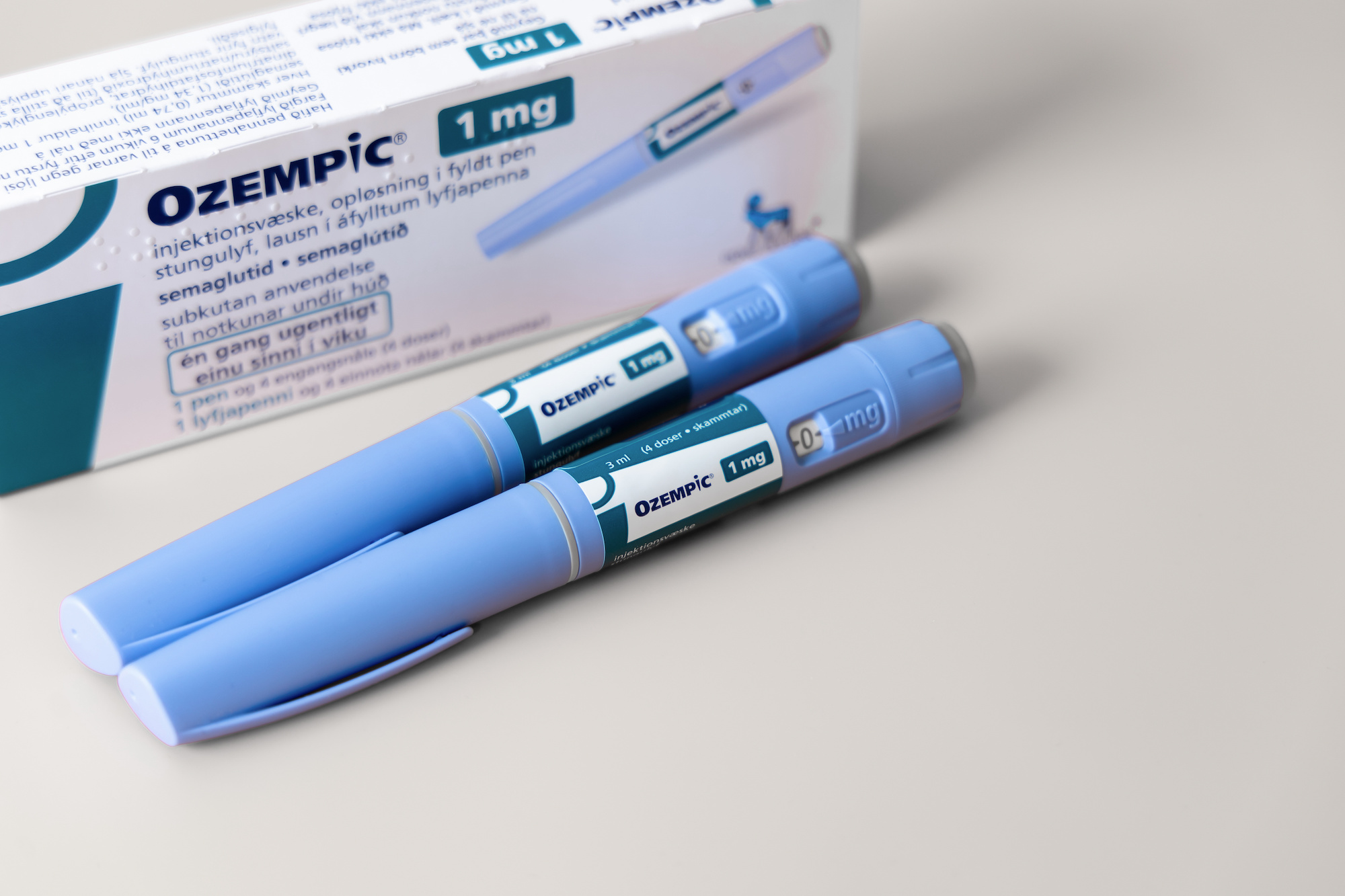Ozempic: What Is It?
Ozempic belongs to a drug class under the Semaglutide Class. Other drugs like Wegovy and Rybelsus also belong to this class; Ozempic is an FDA-approved medication specifically for the treatment of type 2 diabetes. All the drugs in the Semaglutide Class act similarly to the naturally occurring GLP-1 hormone (glucagon-like peptide-1) that is released in the gastrointestinal tract during the digestion process. We want to look at the following roles of the GLP-1 hormone:
- It helps promote the production of insulin, effectively reducing blood glucose (aka sugar), which is why Ozempic is so effective at treating type 2 diabetes.
- In higher doses, it can affect the parts of the brain that cause you not to feel hungry or creates satiety, the feeling of fullness. This is the attraction to use the drug class, specifically Wegovy, as a weight loss agent that we will dive into further.
We are looking to explore all the facts in this blog post so that you can make an educated decision on whether the drugs in the Semaglutide Class are the right choice for you in your weight loss journey.
What You Need to Know About the Semaglutide Drug Class
We will be going into this drug class, more specifically looking at Wegovy. Wegovy can be an excellent tool for rapid weight loss, as shown in many studies. The FDA has only approved Wegovy for weight loss, but it comes with a high side effect profile, so there are a few things to consider before using it for weight loss:
- Wegovy can cause a decrease in muscle mass, lessen bone density, and lower your resting metabolic rate, leading to Sarcopenia. Sarcopenia is the gradual loss of muscle mass, strength, and function and is typically associated with aging.
- There are several levels of doses. Some doctors suggest trying a lower dose for a longer period of time to gauge gastrointestinal side effects.
- There are several side effects including, but not limited to: pancreatitis, hair loss, hypoglycemia, nausea, diarrhea, vomiting, fatigue, constipation, heartburn, sore throat, kidney failure and kidney damage.
- Links to prolonged use of Wegovy and Thyroid cancer.
- Long-term safety is unknown. These classes of drugs are new and have not been tested long-term.
- If being used as a weight loss drug, most insurance companies will not cover it. The average cost for Wegovy, out of pocket, is $1,350-$1,600 a month.
- Drug must be continuously taken to keep the weight off. As soon as a patient stopped taking the drug, at least two-thirds of the original weight lost, came back in a majority of the patients.
Like any trend, there will be many clinics and centers that will pop up offering “cheaper versions” or “knockoffs” to the Wegovy drug. While the FDA has decriminalized this, there is not enough research or oversight to provide adequate safety. The source of the knockoff drugs is typically unknown, and when it is known, semaglutide salts are used, which are proven to not be safe. We always recommend doctor supervision when taking these medications.
Overall, weight loss drugs like Wegovy can be beneficial under the counsel of a health care professional and a healthy diet and lifestyle. Wegovy and other Semaglutide Class drugs have not been around long enough to rule out any long-term side effects. Currently, sustaining the weight loss lost from Wegovy is rare after removing the drug from the equation. There is no denying that these weight loss drugs work to an extent, but always in conjunction with a healthy diet and a health care professional’s support.
Alternatives to Semaglutide
These weight loss drugs are rapid and fast-acting, but did you know that there are some natural ways to increase the GLP-1 activity in your body with food, vitamins, and health habits you may already be implementing in your everyday life?
Here is a list of some of these items:
- Cinnamon
- Curcumin
- Resveratrol (you can find this in some types of wines)
- Gardenia
- Myricetin
- Murieston (flavonoid) -found in fruits, veggies, nuts, tea
- Healthy gut-promoting foods – kimchi, sauerkraut, probiotics
- Vitamin D
- Yerba mate
- Matcha, green tea extract
- Protein rich foods coupled with vegetables and fiber
- Avoiding unhealthy saturated fats
- Eating slowly
- Low and high intensity exercise – any form of movement
Why Dr. Kells’ Weight Loss Does Not Use These Class of Drugs
The bottom line is this: with the extensive list of side effects, inflated cost, and no long-term evidence of sustainable weight loss without the prolonged use of the drug, NONE of it is effective without being used alongside a healthy diet and lifestyle. That is what we do at Dr. Kells’ Weight Loss. We provide you with keys to success in keeping the weight off without the use of the drugs. A lifestyle plan is the most important ingredient in all of this. Do we work with people who are currently on and have taken Wegovy or Ozempic in the past? Yes, we do work with people who have taken and are currently using these drugs. Our plan includes the critical components of a food plan and lifestyle changes that help maintain weight loss after stopping Wegovy. That is the goal: to maintain weight loss with a program that is easily sustainable and not completely ridden with side effects a mile long.
Here are 10 things you need to sustain weight loss from Allison Tannis, MSc RHN at the Pritikin Longevity Center, which align very closely to our principles here at Dr. Kells’ Weight Loss:
- Motivation- find your why.
- Goal setting with a realistic timeline.
- Develop a healthy relationship with food and drink.
- Frequent exercise and muscle-building.
- Ongoing accountability with a trusted friend or personal journal.
- Self-compassion and creativity to overcome challenges.
- Maintain resilience and perspective to endure setbacks.
- Focus on day-to-day successes.
- Flexible “learn from mistakes” growth mindset to fine-tune healthy lifestyle plan for continued results.
- Enjoy the journey, weight loss is better when you are intentionally thankful and not frustrated.
“Medication is like a band aid that can slow down the rate of damage from obesity, diabetes, high blood pressure, high cholesterol, high stress, etc. It can buy time but doesn’t correct the root of problems so negative health consequences can still occur later in life”.
– Dr. Danine Fruge, Medical Director at the Pritikin Center

